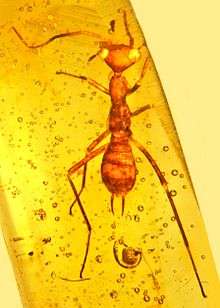Aethiocarenus
Aethiocarenus is an extinct genus of insects which has a single species Aethiocarenus burmanicus described from a 98.79 ±0.62 million year old fossil found in Burmese amber from the Hukawng Valley of Myanmar. The insect is unusual due to the vertex of the triangular head being attached to the pronotum as opposed to the hypotenuse. When first described Aethiocarenus was placed as the sole member of the family Aethiocarenidae and order Aethiocarenodea.[1] However, Aethiocarenus was later considered to be a nymph of Alienopterus.[2] Vršanský et al. (2018) considered Aethiocarenus to be an alienopterid nymph, but considered it distinct from other members of this group and deserving a separate genus rank.[3]
| Aethiocarenus | |
|---|---|
 | |
| Specimen in amber | |
| Scientific classification | |
| Kingdom: | Animalia |
| Phylum: | Arthropoda |
| Class: | Insecta |
| Order: | Blattodea |
| Family: | †Alienopteridae |
| Genus: | †Aethiocarenus |
| Species: | †A. burmanicus |
| Binomial name | |
| †Aethiocarenus burmanicus Poinar & Brown, 2017 | |
Description
Aethiocarenus was probably an omnivore and had a long, narrow, flat body, and long slender legs. The eyes are at the sides of the head, allowing the insect to look behind. Glands on the neck indicate that the creature may have emitted chemicals to repel predators.[4][5]
References
- Poinar, George; Brown, Alex E. (2017). "An exotic insect Aethiocarenus burmanicus gen. et sp. nov. (Aethiocarenodea ord. nov., Aethiocarenidae fam. nov.) from mid-Cretaceous Myanmar amber". Cretaceous Research. 72: 100–104. doi:10.1016/j.cretres.2016.12.011. (Same at researchgate - free)
- Hörnig, Marie K.; Haug, Joachim T.; Haug, Carolin (2017). "An exceptionally preserved 110 million years old praying mantis provides new insights into the predatory behavior of early mantodeans". PeerJ. 5: e3605. doi:10.7717/peerj.3605. PMC 5527957. PMID 28761789.
- Peter Vršanský; Günter Bechly; Qingqing Zhang; Edmund A. Jarzembowski; Tomáš Mlynský; Lucia Šmídová; Peter Barna; Matúš Kúdela; Danil Aristov; Sonia Bigalk; Lars Krogmann; Liqin Li; Qi Zhang; Haichun Zhang; Sieghard Ellenberger; Patrick Müller; Carsten Gröhn; Fangyuan Xia; Kyoichiro Ueda; Peter Vďačný; Daniel Valaška; Lucia Vršanská; Bo Wang (2018). "Batesian insect-insect mimicry-related explosive radiation of ancient alienopterid cockroaches". Biologia. 73 (10): 987–1006. doi:10.2478/s11756-018-0117-3.
- "Ancient, scary and alien-looking specimen forms a rarity in the insect world – a new order". Oregon State University, News and Research Communications. 2017-01-25. Retrieved 2017-01-27.
- Hrala, Josh. "This Scary, Alien-Like Specimen Trapped in Amber Represents a Brand New Order of Insect". ScienceAlert. Retrieved 2017-02-07.